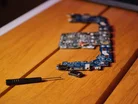Modular Design & Recycled Materials: Dell's Circular PCs

The global issue of electronic waste persistently grows, posing urgent challenges deeply connected to environmental sustainability.
Annually, humanity generates more than 60 million tonnes of electronic waste; a figure steadily increasing by more than 2.6 million tonnes each year.
Projections estimate that by 2030, electronic waste could soar to 82 million tonnes if current trends persist.
Dell is trying to combat this change through designing circularity into its PCs, including AI PCs.
Cassandra Garber, Chief Sustainability Officer at Dell Technologies, says: “I've often said our sustainability strategy is as simple as ‘integration everywhere.’ A perfect example of that in action is the incredible list of circular design examples we can share that span so many aspects of our new AI PCs.”
What is Concept Luna?
Launched in 2021, Dell's Concept Luna showcases its forward-thinking approach to PC design.
This concept aims to embed sustainable technology deeply across Dell's product range.
By embracing principles such as modular design, intelligent telemetry and new strategies for refurbishing, repairing and recycling hardware, Dell sets new industry standards.
Dell's innovation extends into practical designs, such as the Pro and Pro Max notebooks, which are the world’s first commercial notebooks with a modular USB-C port.
Typically, these ports are soldered directly onto the mainboard, a process that is not only emissions-heavy but also complicates the repair and reuse of these components.
Dell improves on this by using screws to secure the ports, which facilitates easier access and minimises the risk of damaging essential computer elements during repairs.
Another area of focus has been on battery technology.
Responding to customer feedback, Dell has made batteries in its devices more accessible to customers for replacement and simplified the cable designs, enhancing the overall repairability of their devices.
Sustainable materials and packaging
Dell has ramped up its use of recycled and renewable materials within its PCs, displays and accessories.
This significantly reduces the environmental footprint of these products.
In 2024 alone, Dell incorporated more than 95 million pounds of recycled and renewable materials, substituting conventional virgin materials and thereby conserving natural resources while curbing waste.
The use of environmentally friendly materials extends to aluminium, bio-based plastic, recycled cobalt and other metals.
Packaging also reflects Dell's commitment to sustainability with 96.4% of it being reusable, renewable or recycled in fiscal year 2024, with a projection of all packaging being made from recycled or renewable materials or reused by 2030.
Michael Dell, Chairman and CEO at Dell Technologies, says: “Sustainability and ESG commitments are now widely recognised as business imperatives that impact everything from supplier decisions to business strategy.
“At Dell, we are both meeting our goals and helping customers meet theirs.”
Promoting reuse and recycling
Dell equips its products with QR codes that not only enable users to easily access support pages, but also encourage the extension of the product lifecycle.
This feature is available in select Alienware PC components, where QR codes provide detailed instructions for upgrades, repairs or replacements, enhancing the product's longevity and utility.
Additionally, Dell offers comprehensive recovery and recycling services, providing both businesses and consumers with efficient options to retire products responsibly while creating opportunities to reuse extracted materials.
By 2030, Dell aims to recycle or reuse a quantity equivalent to every tonne of technology purchased, highlighting their commitment to a circular economy.
Make sure you check out the latest industry news and insights at ClimateTech Digital and be part of the conversation at our global conference series, Sustainability LIVE.
Discover all our upcoming events and secure your tickets today. Subscribe to the ClimateTech Digital newsletter.
ClimateTech Digital is a BizClik brand

